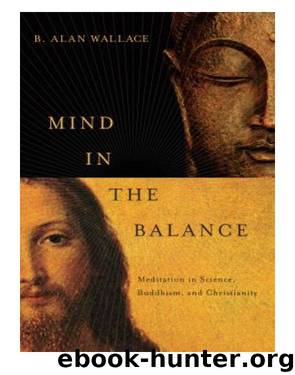Mind in the Balance by B. Alan Wallace

Author:B. Alan Wallace
Language: eng
Format: epub
Publisher: Columbia University Press
Published: 2010-07-01T16:00:00+00:00
PHILOSOPHICAL SKEPTICISM
With the rise of behaviorism in the early twentieth century, subjective experience in general and consciousness in particular were marginalized due to the insistence that the scientific study of the mind be purely objective. B. F. Skinner (1904-90), the most renowned and influential of all American behaviorists, did not question the practical usefulness of the inner world that is felt and introspectively observed, but he insisted that mental states and processes cannot be clearly observed or known.6 In fact, he went so far as to declare that no one has ever directly modified any mental activities or traits such as thoughts, opinions, urges, choice, interests, or daydreams, and that there is no way we can make contact with them.7 This weird claim, so obviously incompatible with everyday experience as well as science, suggests that Skinner had exceptionally limited introspective abilities that severely impaired his understanding of the mind. Rejecting the possibility of defining consciousness in terms of its characteristics as they are experienced firsthand, he chose instead to equate the experience of knowing to a “very special form of behavior.”8 This is a patently false claim, for it is obvious that we can know things before we act on them or without ever acting on them, and human beings and robots alike can engage in unconscious behavior.
From a contemplative perspective, the entire school of behaviorism, for all its valuable insights into human and animal behavior, appears to have been created and developed by individuals who were mentally impaired in terms of their abilities to observe their own subjective experience. It is hardly any wonder then that Skinner and other behaviorists were so intent on characterizing the mind in purely physical terms, first substituting the brain for the mind and then substituting the person for the brain.9
While many scientists today regard the principal views of behaviorism as deeply flawed and long rejected, many of those same beliefs are advocated by contemporary analytical philosophers, such as Daniel C. Dennett. In his view of human nature, “we are robots made of robots—we’re each composed of some few trillion robotic cells, each one as mindless as the molecules they’re composed of, but working together in a gigantic team that creates all the action that occurs in a conscious agent.”10 Although like Skinner, he acknowledges that each of us has our own introspective experience of our mental states and activities, he insists that we must not credit those intuitions. After all, he points out, although it appears that the Sun rotates around the Earth, this perception is misleading, and similar reliance on the introspective appearances of mental events is likewise bound to obscure the real nature of the mind and consciousness. However, if Galileo had not credited his firsthand observations of the Sun, Moon, and planets, enhanced by his use of the telescope, he would never have taken his seminal role in the history of astronomy and science as a whole. But when Dennett considers the potential contributions of Christian and Buddhist contemplatives for
Download
This site does not store any files on its server. We only index and link to content provided by other sites. Please contact the content providers to delete copyright contents if any and email us, we'll remove relevant links or contents immediately.
| Acupuncture & Acupressure | Aromatherapy |
| Ayurveda | Chelation |
| Chinese Medicine | Energy Healing |
| Healing | Herbal Remedies |
| Holistic | Homeopathy |
| Hypnotherapy | Massage |
| Meditation | Naturopathy |
| Reference |
Inner Engineering: A Yogi's Guide to Joy by Sadhguru(6793)
The Power of Now: A Guide to Spiritual Enlightenment by Eckhart Tolle(5781)
Fear by Osho(4738)
Ikigai by Héctor García & Francesc Miralles(4274)
The Art of Happiness by The Dalai Lama(4130)
The Ultimate Bodybuilding Cookbook by Kendall Lou Schmidt(3945)
Yoga Therapy by Mark Stephens(3745)
The Little Book of Hygge by Meik Wiking(3693)
The Healing Self by Deepak Chopra(3578)
Why Buddhism is True by Robert Wright(3452)
The Hatha Yoga Pradipika (Translated) by Svatmarama(3341)
Being Aware of Being Aware by Rupert Spira(3276)
Shift into Freedom by Loch Kelly(3199)
Wild Words from Wild Women by Stephens Autumn(3153)
Work Clean by Dan Charnas(3123)
Happiness by Matthieu Ricard(3047)
More Language of Letting Go: 366 New Daily Meditations by Melody Beattie(3029)
Yoga Body & Mind Handbook by Jasmine Tarkeshi(2879)
Why I Am Not a Feminist by Jessa Crispin(2760)
